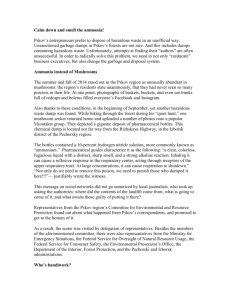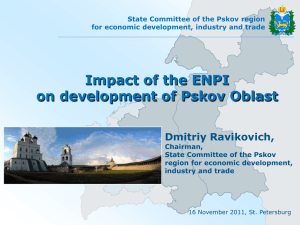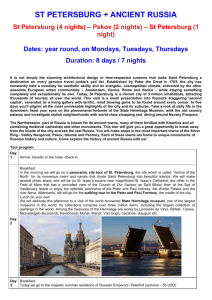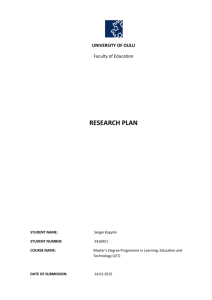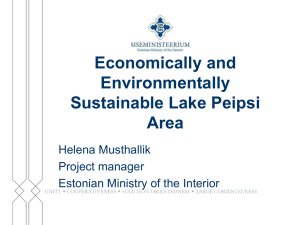Pskov
advertisement
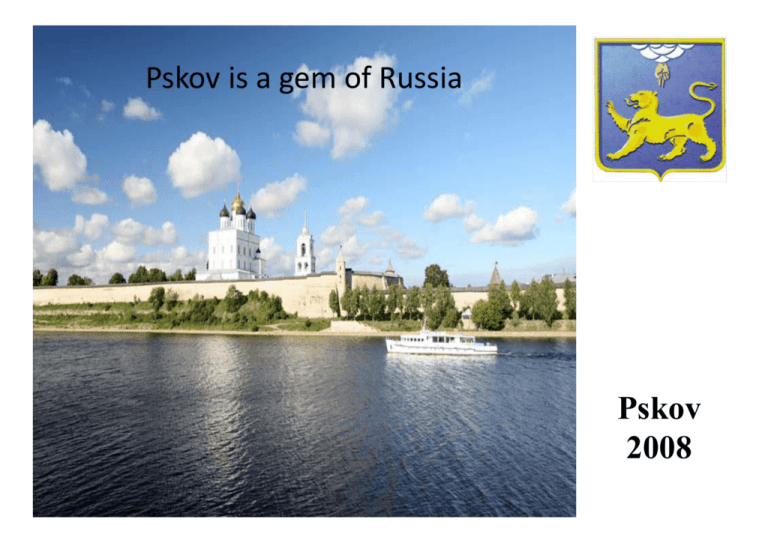
Pskov is a gem of Russia Pskov 2008 Dear friends, I should like to invite you to our ancient Russian city - one of Russia's gems. The trip will give you a unique possibility to learn about Russia's ancient culture. Pskov district was already inhabited early in the first Millennium AD. Pskov itself was first mentioned in the Chronicle in 903. The Warrior City and Intercessor of the North - Western borders of Russia has always been famous for its independence and uniqueness. It was here at the Pskov veche (people's assembly), that the very first shoots of Russian democracy appeared. Already then, Pskov was an important Russian and European trading centre. The Pskov Schools of Architecture and Icon Painting has been world famous since ancient times. Pskov district is also famous for such Orthodox Church holy places as the Mirozhsky and Pechory monasteries, revered by both pilgrims and tourists. Your visit will give you a splendid impression of Russian history, culture and spiritual life. The huge variety of monuments, events and routes will impress even the choosiest of travellers. Pskov's unspoiled and picturesque scenery, the large number of entertainment to be provided as part of the Jubilee celebrations, and low prices are sure to make your trip especially pleasant. Welcome to Pskov! Ivan Tsetsersky Head of the City назад далее начало выход Pskov. Shortly about istory Pskov is one of the most ancient Russian cities. Its first mention refers to 903. It is located in the Baltic sea region, North – Western part of Russia on the confluence of the Pskova and Velikaya rivers, twelve kilometres away from Pskov and Chudskoye water body. Since the very first days of its existence Pskov has had a special role and significance. It is fir 11 centuries that it was a stronghold of the Russian state, it was active in trade with cities of the Hanseatic League. Natural conditions helped the city to develop as a crafts and trading centre of the Russian state. It is here that trading ways from Baltics to the Central Rus crossed. They sold bread and clothes, outlandish goods, honey, fat, woolens and flax. Pskov masons and campanologists, foundry men, coppersmiths were famous all over Russia. For centuries Pskov remained, freedom-loving. All important issues were decided by public veche. назад далее начало выход Pskov. Investment friendly. Favourable location ПСКОВ From From From From From From From From St Petersburg Riga Tallinn Moscow Stockholm Helsinki Berlin Brussels Which guarantees… 286 300 360 600 860 700 1200 1740 кm кm кm кm кm кm кm кm …to Pskov, • entrance to the Russian market • proximity to European sector of the world market • possibility to enter the Baltic sea ports • possibility of cross-border cooperation Pskov and the Pskov region is a comfortable and reliable transport corridor, uniting EU and Russia. назад далее начало выход Pskov. Transport. Pskov is an important transport junction for all the Baltic region. The transit railways connect the North – West of Russia and St Petersburg with Western Europe and Kaliningrad region. By highways it is connected with Baltic countries, Belarus, Ukraine. There is an international airport, river port and customs terminal. назад далее начало выход Pskov. Basic Economic Data Basic Economic Data of 2007 Investments into fixed capital, mln Rbls Foreign investments (Pskov region), thous. USD Including those in Pskov Volume of contract works, mln. Rubles . Commissioned dwelling floor areas, thous. sq. m Retail sales turn over, mln. Rubles Volume of services purchased by the public, mln. Rubles Index of user prices Average labor force in economics Number officially registered unemployed Average monthly earnest per worker, Rubles назад далее начало выход 3160,3 32666,0 29286,8 1788,0 78,1 20191,5 5812,9 112,2% 79,1 th. people 605 people 11.541 Pskov. Priorities in economic and social speres Development priorities •Housing policy, realization of “affordable and comfortable housing to Russian citizens” national project http://gorodpskov.ru/index/action/ShowEvent/id/44 •Heat supply, heating networks construction; •Health care, realization of “Health” national project; http://gorodpskov.ru/index/action/ShowEvent/id/42 •education, realization of the “Education” national project; http://gorodpskov.ru/index/action/ShowEvent/id/43 •culture, maintenance of municipal cultural institutions; •Physical culture and sports, constructing new sports facilities, children’s sports. назад далее начало выход Pskov. City links. Pskov has 17 Agreements with Foreign partners. Pskov’s Sister Cities are: Arles (France)- 1986 Bialystok (Poland) – 2002 Valmiera (Latvia) – 1997 Vitebsk (Byelarus) – 2002 Gera (Germany) – 1969 Daugavpils (Latvia) – 2006 Kuopio (Finland) –1967 Mianyang (China) – 1994 Nijmegen (the Netherlands) 1987 Neuss (Germany) – 1990 Norrtaelje (Sweden) –1993 Perth (Scotlqnd) – 1990 Roanoke (Virginia, USА) – 1992 Таrtu (Estonia) – 2001 Chernigov (Ukraine) –2001 назад далее начало выход Pskov. City links. Successfully developing twinnings promote development of municipal democracy, give an opportunity to thousands of people to get acquainted and establish friendly and business relations. It is thanks to twinnings that new possibilities for people to independently solve many problems arise, to develop initiative and independence of citizens. Numerous exchanges, visits of cultural, youth, tourist delegations create favourable conditions for mutual understanding and credit Pskovites’ international links have been intensively developing in various spheres: •humanitarian, •ecological, •social, •cultural, •scientific •educational •economic. The reliable partnership and principle of openness are the basis of international co-operation. назад далее начало выход Pskov. City links. Nijmegen (the Netherlands) is one of the most active sister cities School exchange назад далее начало выход Pskov. City links. Every year volunteers of International Bouworde (the Netherlands) work at social objects of Pskov. назад далее начало выход Pskov. City links Pedagogical and Curative Centre •Pedagogical and Curative Centre was opened in 1993 for social integration of 84 young people with multiple and severe problems in development. The project was initiated and financed by parish Wassenberg (Germany). In 2007, the Centre’s second building was completed. Total volume of German investments into the Centre is 519.5 thousand EURO. назад далее начало выход Pskov. City links. Integration Workshops for Disabled “The Integration Workshops for Disabled” is a logical continuation of the Pedagogical and Curative Centre project. It was launched in 2001 to work with adults having severe problems in development. In the workshops there is a training department, plant growing, wood processing, sewing, household, development and care departments. German partners provide equipment and organization methods based on German experience, taking account of Russian conditions. Most of the equipment are charitable gifst by the unique NGO “Pskov Initiative in Evangelic Church of Reinland” (Germany.) назад далее начало выход Pskov. City links. Hospice One of the first projects by the “Pskov Initiative in Evangelic Church of Reinland” (Germany) was Sts Martha and Mary Hospice launched in 1993. The project affords availability of medical care and rehabilitation for the most serious category of patients. Hospice has 35 beds, there will be 50 in the future. The German partners have invested over 54 thousand EURO during the years of cooperation. назад далее начало выход Pskov. Foreign Investments Joint ventures with foreign capital On 1.01.2007 there were 119 joint ventures with foreign capital in Pskov. Most of them were Latvian – 65. There were 29 Estonian ventures. Besides, there were also ones with German, American, Swedish, Danish, Lithuanian and Byelorussian investments. The municipal enterprise «Pskovskie Teplovyie seti» is realizing the project «Аutomation and optimization of fuel burning at city boilers, installation automated gas burning systems produced by «Petrocraft» (Sweden)». The project is supported by SIDA. The cost of the project is 269 mln EURO. Among the most successful Joint ventures with foreign capital are PKC Group Oyj and JSC Dula.RU. PCC Group is offers manufacturing services for wiring harnesses, cabling and electronics. The JSC Dula.RU is an offspring of the European holding «DULA-Werke Dustmann & Co.». It produces trading and office equipment and furniture in Pskov. The first stage investment was 5 mln EURO. назад далее начало выход The Pskov Land in the Russian history and the world cultural heritage. VI – VII c. The early settlers of Pskov, the Slavic Krivichi tribe occupied the land and started building there settlements at detinets or the Krom, future spiritual, historic and architectural centre of Pskov. IX c. The city of Pskov is founded at the confluence of the Pskova and the Velikaya rivers. 903 For the first time “The Tale of Bygone years” (a historical Russian chronicle) records Pskov. This happened in connection with the Kievan Prince, Igor, marrying a local lady Olga: “Igor grew up, and set off to collect tribute, the way Oleg used to, and the lands submitted to him, and people brought him a wife from Pskov named Olga”. 988 The Grand Prince Vladimir Svyatoslavovich, Princess Olga’a grandson, sent his son Sudislav to rule Pskov. Sudislav is followed by Christian priests to convert Pskovites to Christianity. Sudislav became the first Pskov Prince. Early XI c. The Pskovites adopted Christianity. Pskov was subjected to Novgorod, preserving its independence to a significant extent. 1137 - 1138 Pskov was ruled by grandson of Vladimir Monomakh, the Righteous Prince and miracleworker, Prince Vsevolod (baptised as Gavriil) became the first Pskov Saint. Vsevolod founded the Trinity Cathedral. In 1192 his relics were brought to the Cathedral. Pskov gained independence from Novgorod. 1156 Construction of the Mirozhski monastery Transfiguration cathedral, world famous for its unique frescos, was completed XII – XV Pskov successfully withstood 26 sieges by the German knights and the troops of the Grand Duchy of Lithuania.. назад далее начало выход The Pskov Land in the Russian history and the world cultural heritage. Late XII c. The Pskov Veche appeared and developed in Pskov. The assembly gathered on the square in front of the Trinity Cathedral. 1240 The campaign of the Livonian order against the Russian lands. It was the first and the only time that Pskov was captured by the enemy. 1242 Liberation of Pskov and Izborsk. The Pskovites and Novgorodians led by Alexander Nevsky won a victory over the German knights during the Battle on Ice on the Chudskoye lake, ending the Crusade. XII-XVI Flourishing of Pskov. The Unique Pskov schools of architecture, painting and icon-painting developed, dozens of churches and monasteries were constructed, the city was brimming with a rich cultural life. Literary masterpieces were created. Pskov history was recorded in chronicles. The city traded with the Hanseatic league. Pskov’s population was over 30000 residents. The author of a German chronicle wrote about Pskov: “Pskov occupies such a vast territory that it could be equalled in its circumference to one of many cities taken together. Germany does not have a city matching up to Pskov.” 1266 – 1299 Pskov is ruled by Prince Dovmont Timofei, who defeated numerous enemies of the city. Dovmont was canonized and his remains are kept in the Trinity Cathedral. 1330 The Pskovites build a new stone fortress in Izborsk. 1330 Pskov people built a new stone fortress in Izborsk.. 1386 Yefrossin Pskovskiy , the future Pskov Saint and the founder of Our Saviour’s Yelesarovo Monastery, was born in the village of Videlebiye in the vicinity of Pskov. 1424 The Pskov mint was founded. The city coins its own money. назад далее начало выход The Pskov Land in the Russian history and the world cultural heritage. 1472 The foundation of the Dormition of Our Lady Monastery in Pechori 1472 Foundation of the Pechory Dormition monastery. 1476 - 1479 Pskov masons build the Cathedral of Annunciation and the Church of the Deposition of the Robes of Our Lord in the Moscow Kremlin. 1510 Pskov loses its independence and enters the unified Russian state. About 1520 A big bell casting shop was founded. Bells were cast for Snetogorsky. Mirozhsky, Pechory, Solovetsky and many other monasteries and churches. 1547 Pskov icon painters were invited to the Moscow Kremlin for painting works after the fire. 1576 The death of Saint Righteous "God's fool" Nicholas Sallos , having saved Pskov from bloodshed and devastation by Ivan the Terrible. His relics lie in the Holy Trinity Cathedral. 1581 – 1582 The Pskov walls were unsuccessfully besieged by the army of Stephan Bathori for 5 months. «Admiring Pskov. “O Lord, what an enormous city! Like Paris! …»” - the King’s secretary Jan Piotrowski wrote in his campaign diary. «Pskov saved Russia from the greatest danger and the memory of this important service shall not be wiped off our h istory until we lose our love for Fatherland. (N.М. Каramzin).. 1585 The Saint Annunciation Nikandrova hermitage was founded. 1589 The independent Pskov Eparchy was formed. 1615 Pskov was besieged by the troops of the Swedish King Gustavus Adolphus назад далее начало выход The Pskov Land in the Russian history and the world cultural heritage. 1634 Ioassaf, the Archbishop of Pskov and Velikiye Luki, became Patriarch of Moscow and all Russia. 1660 год Pskov icon painters are called to Moscow for painting works in churches. 1699 The newly built Holy Trinity Cathedral was consecrated, which preserves its appearance today. 1701 – 1708 Peter I repeatedly visited Pskov personally to lead the construction of defence fortifications during the Northern war. The Tsar stayed at the chambers of the rich merchant Yamskoi. 1812 The Patriotic war started. The Russian army was under the command of the Pskov noble M.I.Kutuzov. 1820-iеs A.S.Pushkin repeatedly visited Pskov. 1824 – 1826 The Mikhailovskoye exile of Pushkin. Here the poet later wrote many chapters of his novel in verse ”Eugene Onegin”, the poem “Gypsies”, and the national folk drama “Boris Godunov”. 1837 The great Russian poet A.S.Pushkin was buried in the Svyatogorski monastery on February 6th (19th February new style). назад далее начало выход The Pskov Land in the Russian history and the world cultural heritage. 6 – 9 August 1903 Nicholas II visited Pskov. The Tsar inspected a parade, visited the Holy Trinity cathedral, the Morozhski monastery, and toured the city. Russia celebrated Pskov’s thousandth anniversary. 1908 The great Russian composer N.A.Rimski – Korssakov died in Lubensk estate (the Pliusski district of the Pskov region now). 1917 On March 2nd (March 15th by new style) at the Pskov railway station in his saloon carriage, the last Russian emperor Nicholas II signed his Manifesto of Abdication from the Russian throne. 1920 - ies Icons and ancient relics were withdrawn from churches and monasteries. Churches were closed and priests persecuted. 1941 – 1944 Pskov was occupied by German fascist invaders. On July 23rd 1944 Pskov was liberated. Only 83 buildings escaped destruction. 1945 On November 1st the government adopted Decree on immediate restoration of the 15 cities having most suffered from fascist invaders. Pskov was among them. Late XX – early XXI centuries Rebirth of Pskov churches and monasteries. At the moment there are 28 acting churches in Pskov. 2000 On March 1st 90 heroic paratroopers of the 6th airborne company from Pskov were having a many hours furious unequal fighting with a two thousand gun-men detachment in Argunskoye gorge (Chechnya). 84 men were killed, 30 of them were born in Pskov and the Pskov region. 2003 Pskov celebrated the 1100th anniversary of its first mention in “the Tale of Bygone Years”. Monuments to Princess Olga by sculptors V. Klykov and Z. Tsereteli were unveiled назад далее начало выход
